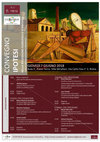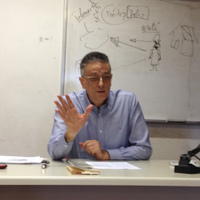Books by Massimo Catapano
Papers by Massimo Catapano
This paper deals with the relation between the epistemic foundationalism
of the Dogmatists and th... more This paper deals with the relation between the epistemic foundationalism
of the Dogmatists and the Agrippan modes of hypothesis and
disagreement. It is my intention to show that the hypothetical mode is a
special case of disagreement primarily adopted by the Sceptics to question
the validity of the foundationalist theories of knowledge.
Lexikon Philosophicum, 2018
The article aims to evaluate some appreciable contributions by post-
Chrysippean Stoics to the th... more The article aims to evaluate some appreciable contributions by post-
Chrysippean Stoics to the theory of cognitive (kataleptic) impression and its role as a criterion of truth. The inquiry focuses on two testimonies: Sextus Empiricus, M, VII, 253-257, where we find a significant variation – introduced by some ‘recent Stoics’ – of the ancient Stoic theory of the clauses that an impression is supposed to satisfy in order to be
considered not only kataleptic, i.e. worthy of assent, but also a criterion of truth; and PBerol. inv. 16545 containing the version of the theory of clauses of the cognitive impression developed by Antipater of Tarsus.
In this paper, I shall attempt a brief reconstruction of the epistemological
views of Pyrrho and ... more In this paper, I shall attempt a brief reconstruction of the epistemological
views of Pyrrho and Aenesidemus. For Pyrrho, I shall rely mainly on Aristocles’ testimony
(Aristocl. ap. Eus., PE XIV 18, 1-5), whereas for Aenesidemus, I shall take into account
the Sextan version of the ten and eight modes of suspension of judgment (PH, I, 35-163;
180-186). In this way, I intend to highlight some of the distinctive features of Pyrrhonian
scepticism.
In this paper I aim to examine what type of theory of epistemic justification is at stake in the ... more In this paper I aim to examine what type of theory of epistemic justification is at stake in the Regress Mode, a celebrated sceptical argument frequently used by Sextus Empiricus. Although the Regress Mode does not work on its own but in combination with other Agrippan Modes – argumentative strategies that interact with each other as an elaborate system – I shall focus almost exclusively on the Regress Mode because it seems to me to offer a more direct way to understand the Aristotelian foundationalist conception of epistemic justification that supports it.
The purpose of the present article is to show that the key to understanding the philosophical mea... more The purpose of the present article is to show that the key to understanding the philosophical meaning of the Two Modes of Scepticism is directly linked to the metaepistemic function performed by the criterion of truth (kriterion tes aletheias) in the Hellenistic theories of knowledge. Since the criterion can also be regarded as an epistemic instrument through which it is possible to immediately identify the foundational elements upon which our knowledge of the world is based, the Two Modes show the problems that arise when we try to incontrovertibly identify a set of special and foundational elements that have no need of further justification.
This paper focuses on the long-debated issue about the nature and scope of suspension of judgment... more This paper focuses on the long-debated issue about the nature and scope of suspension of judgment (ἐποχή) in Sextus Empiricus's Outlines of Pyrrhonism. According to the urbane interpretation, the Sceptic questions only philosophical and scientific matters, leaving everyday beliefs intact. According to the rustic interpretation, the Sceptic lives without beliefs of every kind. I believe that a new light can be shed on this issue if we take into account the peculiar relationship that scepticism has to history and nature.
How can Plato, who uses dialogues, i.e. literary works founded on imitation (μίμησις), be such a ... more How can Plato, who uses dialogues, i.e. literary works founded on imitation (μίμησις), be such a harsh critic of imitation? Plato seems to be both a literary artist who denies the value of imitation and an opponent of traditional myths that, in spite of this fact, makes use of mythical stories in several key passages of his dialogues. These are the paradoxes that this paper tries to analyze, taking into account several passages of the Republic and Sophist in which maybe can be found a solution to the abovementioned problem.
This paper argues that Sceptic philosophers' search for the truth is different from the Dogmatic ... more This paper argues that Sceptic philosophers' search for the truth is different from the Dogmatic one: the Sceptics indeed investigate the truth of Dogmatic philosophers' theories. That is not inconsistent with a genuine search for truth, since the Sceptics do not maintain that the Dogmatic philosophical theories are necessarily false.
This paper analyzes a single theoretical aspect of the so-called «problem of the criterion», whic... more This paper analyzes a single theoretical aspect of the so-called «problem of the criterion», which was for the first time formulated by Sextus Empiricus in his Outlines of Pyrrhonism. It stresses the circularity of arguments designed to conclusively justify the criterion of justication postulated by a theory of knowledge. Formulated in this manner, this problem can be defined a metaepistemological one. Roderick Chisholm has tried to deal with it in a manner that maybe misses the point of Sextus’ argument.
Syzetesis, aprile 2013 1 FISIOLOGIA E STOICISMO NE «LE PASSIONI DELL'ANIMA» DI CARTESIO 1 di Mass... more Syzetesis, aprile 2013 1 FISIOLOGIA E STOICISMO NE «LE PASSIONI DELL'ANIMA» DI CARTESIO 1 di Massimo Catapano La filosofia non è un'arte che cerca il favore popolare e non è fatta per essere ostentata; non consiste nelle parole, ma nei fatti. Di essa non ci si vale per far trascorrere piacevolmente le giornate, per eliminare il disgusto che viene dall'ozio: educa e forma l'animo, regola la vita, governa le azioni, mostra ciò che si deve o non si deve fare, siede al timone e dirige la rotta attraverso i pericoli di un mare agitato. Senza di lei nessuno può vivere tranquillo e sicuro; in ogni momento si presentano innumerevoli circostanze che esigono una direttiva, e questa bisogna cercarla nella filosofia. SENECA, Epistulae, II, 16, 3.
Journal Special Issues by Massimo Catapano
Book Reviews by Massimo Catapano
Call for Papers by Massimo Catapano
The conference, organized in Rome by the Philosophical Association Syzetesis
(http://www.syzetesi... more The conference, organized in Rome by the Philosophical Association Syzetesis
(http://www.syzetesis.it/index.html), intends to promote original papers, either
addressing the historical analysis of the above issues, or opening new lines of
theoretical research concerning the relationship between nomos, ethos and philia,
in their several philosophical variations.
Conference Presentations by Massimo Catapano
Conference Alerts by Massimo Catapano
Events by Massimo Catapano

Il convegno, organizzato da Syzetesis – Associazione filosofica (www.syzetesis.it) e ospitato dal... more Il convegno, organizzato da Syzetesis – Associazione filosofica (www.syzetesis.it) e ospitato dal Dipartimento di Filosofia della Sapienza Università di Roma, raccoglie contributi e linee di ricerca di storici della filosofia e filosofi della scienza sul problema dell’ipotesi. Da concetto astratto e polisemico – che spazia dalle concezioni ipotetiche e congetturali della conoscenza fino al senso generalissimo di proposizione originaria assunta a fondamento di un’argomentazione – al suo uso come strumento euristico e procedurale in grado di svolgere un ruolo non secondario in molteplici ambiti della ricerca scientifica, il tema dell’ipotesi permette ancora oggi di sviluppare nuove tendenze teoriche e interpretative. Particolare attenzione sarà riservata alla storia della logica e dell’epistemologia, all’uso dell’ipotesi nella pratica scientifica di età moderna e, infine, alle nuove tendenze teoriche nell’ambito della filosofia della mente e dell’intelligenza artificiale.










Uploads
Books by Massimo Catapano
Papers by Massimo Catapano
of the Dogmatists and the Agrippan modes of hypothesis and
disagreement. It is my intention to show that the hypothetical mode is a
special case of disagreement primarily adopted by the Sceptics to question
the validity of the foundationalist theories of knowledge.
Chrysippean Stoics to the theory of cognitive (kataleptic) impression and its role as a criterion of truth. The inquiry focuses on two testimonies: Sextus Empiricus, M, VII, 253-257, where we find a significant variation – introduced by some ‘recent Stoics’ – of the ancient Stoic theory of the clauses that an impression is supposed to satisfy in order to be
considered not only kataleptic, i.e. worthy of assent, but also a criterion of truth; and PBerol. inv. 16545 containing the version of the theory of clauses of the cognitive impression developed by Antipater of Tarsus.
views of Pyrrho and Aenesidemus. For Pyrrho, I shall rely mainly on Aristocles’ testimony
(Aristocl. ap. Eus., PE XIV 18, 1-5), whereas for Aenesidemus, I shall take into account
the Sextan version of the ten and eight modes of suspension of judgment (PH, I, 35-163;
180-186). In this way, I intend to highlight some of the distinctive features of Pyrrhonian
scepticism.
Journal Special Issues by Massimo Catapano
Book Reviews by Massimo Catapano
Call for Papers by Massimo Catapano
(http://www.syzetesis.it/index.html), intends to promote original papers, either
addressing the historical analysis of the above issues, or opening new lines of
theoretical research concerning the relationship between nomos, ethos and philia,
in their several philosophical variations.
Conference Presentations by Massimo Catapano
Conference Alerts by Massimo Catapano
Events by Massimo Catapano
of the Dogmatists and the Agrippan modes of hypothesis and
disagreement. It is my intention to show that the hypothetical mode is a
special case of disagreement primarily adopted by the Sceptics to question
the validity of the foundationalist theories of knowledge.
Chrysippean Stoics to the theory of cognitive (kataleptic) impression and its role as a criterion of truth. The inquiry focuses on two testimonies: Sextus Empiricus, M, VII, 253-257, where we find a significant variation – introduced by some ‘recent Stoics’ – of the ancient Stoic theory of the clauses that an impression is supposed to satisfy in order to be
considered not only kataleptic, i.e. worthy of assent, but also a criterion of truth; and PBerol. inv. 16545 containing the version of the theory of clauses of the cognitive impression developed by Antipater of Tarsus.
views of Pyrrho and Aenesidemus. For Pyrrho, I shall rely mainly on Aristocles’ testimony
(Aristocl. ap. Eus., PE XIV 18, 1-5), whereas for Aenesidemus, I shall take into account
the Sextan version of the ten and eight modes of suspension of judgment (PH, I, 35-163;
180-186). In this way, I intend to highlight some of the distinctive features of Pyrrhonian
scepticism.
(http://www.syzetesis.it/index.html), intends to promote original papers, either
addressing the historical analysis of the above issues, or opening new lines of
theoretical research concerning the relationship between nomos, ethos and philia,
in their several philosophical variations.